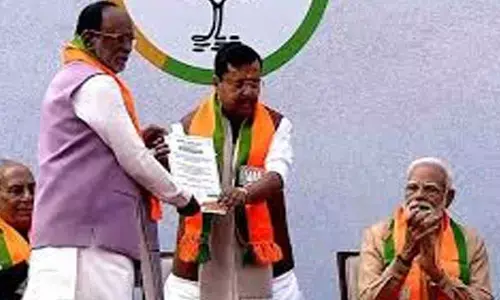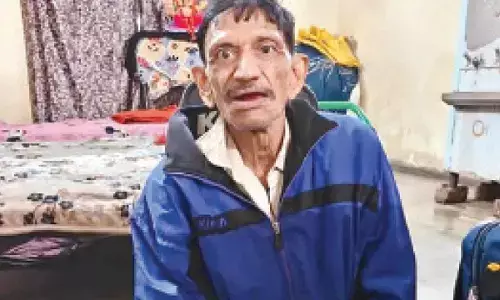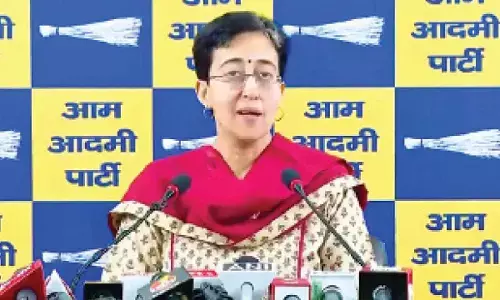The much revered Anjali Devi

The Much Revered Anjali Devi. Heroines making a comeback in mother’s roles is back in trend. Legendary actress Anjali Devi belonged to the first generation of female lead actors in Telugu films, who had made the transition from a heroine to a character actor with much dignity and poise.
Heroines making a comeback in mother’s roles is back in trend. Legendary actress Anjali Devi belonged to the first generation of female lead actors in Telugu films, who had made the transition from a heroine to a character actor with much dignity and poise. In addition to a long illustrious career, she had garnered everlasting fame that stood the test of time
Pesteryear heroine, Anjali Devi started her career in 1947 and until 1963; she had played the young female lead in many films, portraying several characters, displaying varied shades with much aplomb. She slowly started making a mark for herself in mythologies, folklores and historical films where she displayed such grace and poise that it came to be believed that none else can play the characters so well.

And as years went by, she metamorphosed into a character actor taking up roles of elderly women – as a mother and sister-in-law in many hit films until early 90s before she stopped acting in films. During the later years of her acting career, she had become a prototype of a compassionate and caring mother, film after film.
The attributes Anjali Devi brought into her roles, especially as an even-tempered, imperturbable mother in films like ‘Badi Panthulu’ and ‘Tata Manavadu’ (both released in 1972) were rare. As a gentle, mild-mannered sister-in-law in films like ‘Dasara Bullodu’ (1972), ‘Aadarsa Kutumbam’ (1969), she etched out performances in an exemplary style and elegance.
Anjali Devi was born in Peddapuram, East Godavari district on August 24, 1927 and was a stage artiste right from her childhood. She was married in her early teens to C Adinarayana Rao, a music director for the stage plays. Later, Adinarayana Rao became a successful music director in films. Almost all of the films produced by Anjali Pictures (her own production banner) had Adinarayana Rao as the music director.
Chittajallu Pullaiah, a celebrated director of Telugu films, in the nascent years of his film career, introduced her into films with ‘Gollabhama’ in 1947. Quite interestingly C Pullaiah was also the director for ‘Lava Kusa’ (1963) wherein Anjali Devi played her best role as Sita, Lord Rama’s wife, abandoned to forest at an advanced stage of pregnancy.
The role of Sita was the zenith of Anjali Devi’s career. She is revered and remembered by multitudes of audiences for that single role relegating every other character to lesser significance. The small yet impactful scene when Lakshmana leaves Sita in the forest stands as a true testimony to the high level of histrionics Anjali Devi is capable of. Towards the climax too, the nonchalant, resigned manner in which Sita walks into the lap of her mother, Bhoodevi, after handing over Rama’s sons to him is also a proof for Anjali Devi’s deep understanding of any character that she dons.
Her role as Leelavathi (mother of Prahlada) in ‘Bhakta Prahlada’ (1967) is also much acclaimed, yet comes only next to Sita of ‘Lava Kusa’. She could bring life into the forlorn, respectable mythological lead lady roles with an uncommon tryout of underplay. The diction and perfect delivery of words were all grand plus points to her.
Her debut film ‘Gollabhama’ released in 1947 was a success and Anjali Devi had no reason to look back and for about half a century she acted in nearly 350 films appearing in characters of various hues. But for the initial handful of films where she played playful roles, she acted in traditional, dignified roles all through her career.
Anjali Devi played the role of a vamp in her very first film ‘Gollabhama’ (1947) directed by C Pullaiah. In ‘Bala Raju’ (1948) and ‘Keelu Gurram’ (1948) she had to portray similar characters with negative shades. She had to be content with films based on folklore themes like ‘Mayalamari’, ‘Stree Sahasam’, ‘Swapna Sundari’ and ‘Maya Rambha’ for the next five years until she got a break in social films in ‘Pakkinti Ammayi’ (1953), the original version of the popular Hindi film ‘Padosan’. In films like ‘Paradesi’, ‘Rechukka’ and ‘Sangham’, she acted opposite with celebrated actors of the time like ANR, NTR and Sivaji Ganeshan.
Anjali Devi had the rare distinction of producing as many as 27 films under ‘Anjali Pictures’ banner. The first film ‘Anarkali’ (1957) itself was a major hit. She played the title character in the film as the classic lover falling in love with Salim, the son of the Mughal king Akbar. ‘Anarkali’ was also a musical hit, legendary ANR played Salim and SV Ranga Rao appeared as Akbar. Songs like “Jeevithame saphalamoo”, “Rajasekhara nee pai moju teera ledura…..” are popular even today. Anjali Devi’s husband Adinarayana Rao composed music for all the films produced under the banner. Be it ‘Suvarna Sundari’ (1957) or ‘Bhakta Tukaram’ (1973), Adinarayana Rao’s tunes have had an everlasting appeal. ‘Suvarna Sundari’ with ANR in the male lead role was a super in Tamil as well as Hindi. Anjali, as the damsel-dancer from heavens was at the prime of her looks and dancing talent. ‘Sati Sakku Bai’, and ‘Sati Sumati’ from Anjali Pictures also did well, commercially.
‘Kalyana Manapam’ (1971) directed by thespian V Madhusudana Rao also proved Anjali Devi’s dexterity as the tormented mother of Kanchana.
‘Jaya Bheri’ (1959) directed by P Pullaiah was another great musical drama with a reformatory content wherein a traditional orthodox Brahmin lad with a penchant for reform (played again by ANR) falls in love with a dancing dame, much against the society’s restrictions. The film was a huge box-office hit and also received wide critical appreciation. Almost all songs from the film composed by Pendyala Nageswara Rao have defied the test of time and are revered as best examples of semi-classical tunes in films.
‘Sarvadhikaari’ and ‘Marmayogi’ made in the early 50s are two bilingual films made in Tamil and Telugu in which late MGR played the male lead. Likewise, ‘Jayasimha’ (1955) was NTR’s own film produced both in Telugu and Tamil with Anjali Devi as the lead lady. In ‘Panduranga Mahatyam’ (1957) also made by NTR, Anjali played the lead role. ‘Bhatti Vikramarka’ (1960) directed by the lesser known director Jampana with NTR and Anjali Devi was also a big hit commercially.
In ‘Chenchu Lakshmi’ (1958), she played the title role (of Mahalakshmi, the consort of Lord Vishnu) loaded with all the required ease and effortlessness as a tribal lady. The breezy freshness she imparted to the song “Chettulekkagalava…O Narahari…Puttalekkag alava….” displays Anjali Devi’s adaptability as the role demands.
In later years too, she played important roles in successful and meaningful films ‘Brundavanam’ (1993) featuring Rajendra Prasad and Ramya Krishna. She bagged the Filmfare Best Actress award in the Telugu Cinema category for four times in five years – ‘Anarkali’, ‘Suvarnasundari’, ‘Chenchu Lakshmi’ and ‘Jayabheri’ (1955, 1957, 1958 and 1959 in that order), a feat simply unthinkable by today’s standards.
She was awarded Raghupathi Venkaiah Award in 1994 for her lifetime service to the Telugu film industry and ANR National Award in 2008.
Though some of her contemporary lead ladies like Bhanumathi and Savitri tried their hand into directing films, Anjali Devi did not tread that path. This decision appears to have been consciously taken keeping in view of the complexities involved while handling the megaphone.
She was, for a long time a devotee of Puttaparthi Saibaba and as a reverential demonstration, Anjali Devi produced a TV serial ‘Sathya Sai Divya Katha’. She breathed her last on January 13, 2014, at Chennai, at the age of 86, with cardiac problems.










